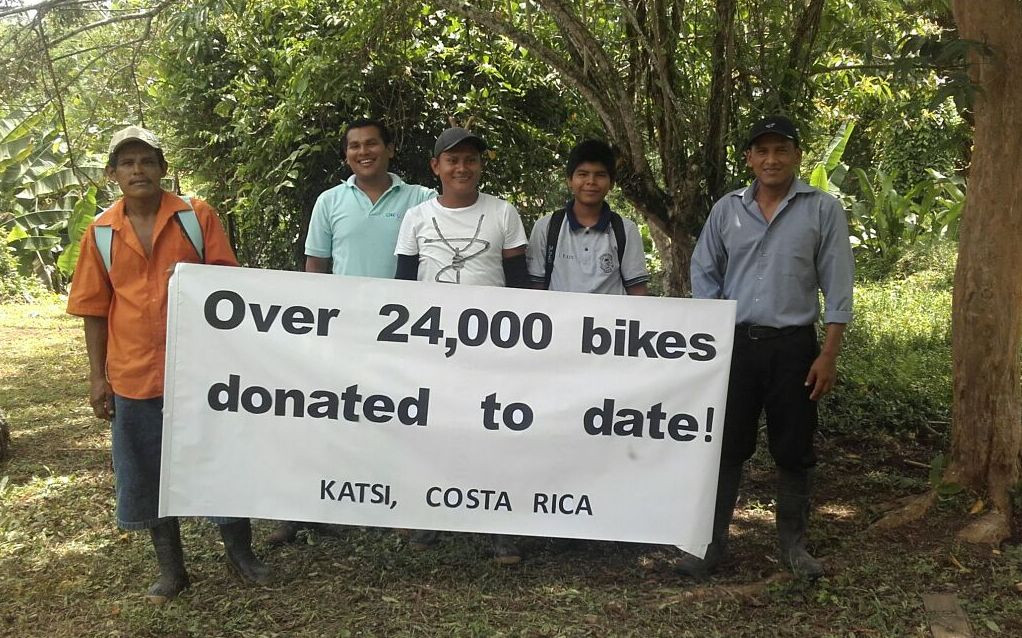Creating Access to Credit
Above are some of the founding members of Katsi, a co-op formed by Fundacion Integral Campesina (FINCA), a nonprofit group that works with Bikes for the World in Costa Rica. FINCA empowers rural communities to form collective banks with small amounts of capital, which members can then borrow to start a business or grow an existing one. By working with BfW through the MiBici project, co-ops such as Katsi can increase their capital by selling our donated bikes. This in turn creates more opportunities to grow businesses in these remote regions of the country. This photo is from 2016; we have now donated 45,000 bikes to FINCA who has distributed them all across Costa Rica.
Katsi is located in the province of Limón, Talamanca along the south eastern coast of Costa Rica. It was formed in 2011 and had 14 members. This was the same community visited by reporters from the Washington Post, the same year, who followed a shipment of bikes from BfW to this remote region. At the time, there was no formal system in place to support the bike project. When we returned in 2016 to check on the bikes donated previously, we found many of the beneficiaries visited by the Washington Post were no longer riding the bikes we donated. Some were missing parts, broken, rusted, or the bikes had been stolen.
This elevated the need to rebuild the bike component of the microfinance groups throughout the country. FINCA went in and established points of contact for MiBici, supplying them with tools and skills training to ensure that bikes were being repaired AND maintained within the rural communities that may not have immediate access to bike parts or mechanics. Several years later, FINCA also restructured the shipments coming from BfW to allow more bikes to be accessed by more groups annually, to help grow the capital needed for rural projects on a regular basis.
Katsi serves the indigenous communities in Costa Rica. They are very remote, yet sustainable villages, but by far the lowest income per capita in the country. Given their location and resources, access to formal bank loans would be impossible if not for Katsi.
Jesús Mayorga Paez (seen above in the pale green shirt, second from left) worked for Katsi back in 2016. He helped grow membership and oversee loans in the community. Katsi now has 219 members and 184 clients benefiting from that financial help.
Loans are meant for productive projects, such as farmers buying seed or tools or perhaps a teacher who needs a computer. Members can also secure a loan to improve their homes. These are things that are not always produced in their communities and people would have a hard time buying without financial help.
Katsi can determine who receives a loan, how it is to be repaid and at what interest rate. Bikes are sold to help increase capital which is sometimes more valuable to these remote regions than the bikes themselves.
Jesús is now a farmer who works at three different farms. Originally he purchased a bicycle to travel between two of the farms. He has more recently taken a loan to buy this motorcycle, which allowed him to take on a third farm. The motorcycle makes his job even faster and more productive and leaves more time for his family.
Jesús harvests bananas, plantains and cacao at the two closer farms. With the use of his motorcycle he is also able to commute to a further farm that grows abacá . Farmers like Jesús extract the fiber from Abacá bark and export the raw materials to Japan where they are used to make paper, money, clothes and many other items. These types of exported items help bring money into these indigenous communities which struggle to maintain balance between their heritage and an ever evolving world.



11720 Parklawn Dr
Rockville MD 20852 703-740-7856 Contact Us